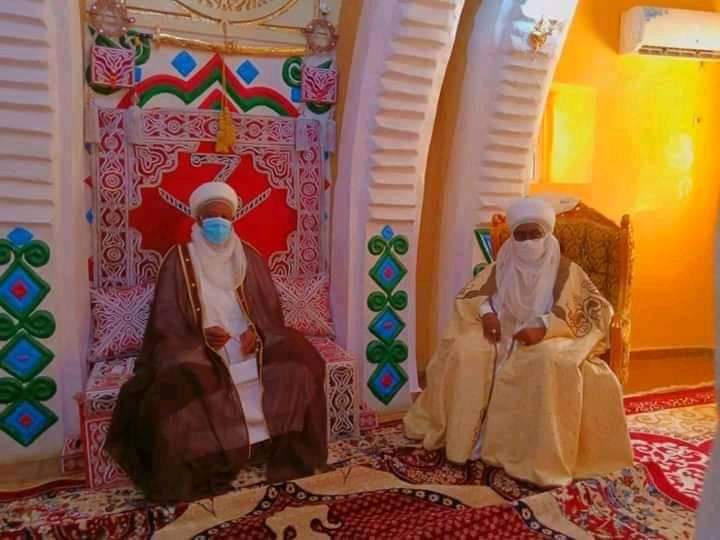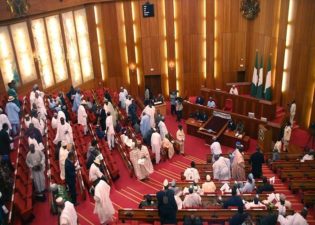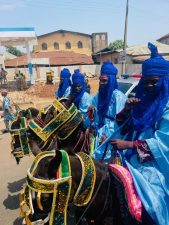By BASHIR ADEFAKA
The visit to Zaria, the official headquarters of the traditional state of Zazzau Emirate by Sultan of Sokoto, Alhaji Muhammad Sa’ad Abubakar, has been described as one that provides more opportunities than seen for Nigerians and others outside the country deprived from knowledge of the past due to politicians’ removal of history from the curriculum of Nigeria’s educational system.
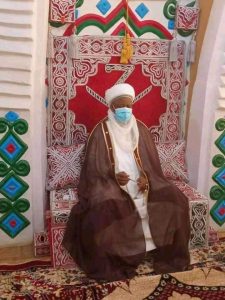
Sultan of Sokoto during his recent visit to the Emir of Zazzau, Alhaji Ahmed Nuhu Bamalli.
The Sultan is the President of Northern Nigeria Traditional Rulers Council, Chairman National Traditional Rulers Council of Nigeria and, concurrently, also doubles as the Leader of Nigeria’s over 100 million Muslims under his office as President General, Nigeria Supreme Council for Islamic Affairs.
He leads the beautiful cultures of the Hausa-Fulani of Nigeria where first, second and thought thoughts of an average man is about Islam thus making the Africa’s biggest region naturally known to be Islamic society to the extent that even the British colonialists, despite taking over of rule in amalgamated Nigeria, respected the existing system on ground in the North. Whereas they introduced direct rule system in the Southern Protectorate, the white’s inability to puncture the already well grounded traditional and religious systems of the Hausa-Fulani race, carried out their activities in Northern Protectorate under the indirect rule.
As tradition demands, His Royal Highness Alhaji Ahmed Nuhu Bamalli had visited the palace of Sultan of Sokoto to pay homage to the President of the Northern Nigerian Council of Traditional Rulers on Tuesday 20 October 2020, precisely 13 days after his appointment in Zaria on 7 October 2020 as the 19th Emir of Zazzau by Governor of Kaduna State, Mallam Nasir el-Rufai, on 7 October 2020.
He succeeded the late Emir Shehu Idris following his death in September, 2020.
The Zazzau, also known as the Zaria Emirate, is a traditional state with headquarters in the city of Zaria, Kaduna State, Nigeria. The current Emir of Zazzau is Alhaji Ahmed Nuhu Bamalli who succeeded the … Hausa historian and the second Sultan of Sokoto, to have been the first to establish a kingdom among the Hausa.
Zazzau, also known as the Zaria Emirate, is a traditional state with headquarters in the city of Zaria, Kaduna State North West Nigeria.
The most important source for the early history of Zazzau is a chronicle composed in the early 20th century from oral tradition. It tells the traditional story of the foundation of the Hausa kingdoms by the culture hero Bayajidda, and gives a list of rulers along with the length of their reigns. According to this chronology, the original Hausa or Habe kingdom is said to date from the 11th century, founded by King Gunguma. This source also makes it one of the seven Hausa Bakwai states.
Zazzau’s most famous early ruler was Her Royal Highness Queen Amina, who ruled either in the mid-15th or mid-16th centuries, and was held by His Eminence Muhammed Bello, an early 19th-century Hausa historian and the second Sultan of Sokoto, to have been the first to establish a kingdom among the Hausa.
Zazzau was a collection point for slaves to be delivered to the Northern markets of Kano and Katsina, where they were exchanged for salt with traders who carried them North of the Sahara.
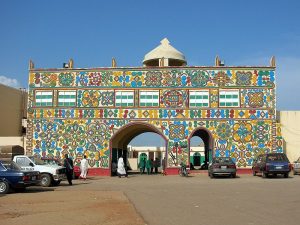
The beautiful Fulani decorated royal gate of the Palace of Emir of Zazzau.
According to the history in the chronicle, Islam was introduced to the kingdom around 1456, but appears to have spread slowly, and pagan rituals continued until the Fulani conquest of 1808. At several times in its history, Zazzau was subject to neighbouring states such as Songhai, Borno and Kwararafa.
In December 1808, the kingdom was captured in the Fulani reformist jihad. The Hausa ruler had escaped to Abuja, where he established a state now known as the Suleja Emirate, retaining his independence and the title of “Sarkin Zazzau”. The ruler of the modern Zazzau Emirate also uses the title “Sarkin Zazzau” or “Sarkin Zaria”.
After the jihad, the culturally similar but pastoral or nomadic Fulani intermarried with the more settled Habe farmers, and the people of the Emirate today are generally known as Hausa-Fulani. The government of the Zaria Emirate differed from other emirates created at this time in that offices were rarely hereditary, but were appointed based on merit or obligation.
External links to some of the points provided above as shown on https://en.wikipedia.org/wiki/Zazzau include Dan Isaacs (September 28, 2010) and “Nigeria’s emirs: Power behind the throne”. BBC News. Retrieved 2010-09-29
Table below interestingly presents tabulated history of rulership of Zazzau Emirate:
Hausa kingdom
Rulers of the Hausa kingdom:
| Start | End | Ruler |
|---|---|---|
| 1696 | 1701 | Bako III dan Musa |
| 1701 | 1703 | Ishaq |
| 1703 | 1704 | Burema II Ashakuka |
| 1704 | 1715 | Bako IV dan Sunkuru |
| 1715 | 1726 | Muhamman dan Gunguma |
| 1726 | 1733 | Uban Bawa |
| 1733 | 1734 | Muhamman Gani |
| 1734 | 1734 | Abu Muhammadu Gani |
| 1734 | 1737 | Dan Ashakuka |
| 1737 | 1757 | Muhamman Abu III |
| 1757 | 1759 | Bawo |
| 1759 | 1764 | Yunusa |
| 1764 | 1767 | Yaqub |
| 1767 | 1773 | Aliyu |
| 1773 | 1779 | Cikkoku |
| 1779 | 1782 | Muhamman Mai Gamo |
| 1782 | November 1806 | Ishaq Jatau |
| November 1806 | December 1808 | Muhammad Makau dan Ishaq Jatau |
Independent Fulani rulers
Rulers of the independent Fulani emirate:
| Start | End | Ruler |
|---|---|---|
| 31 December 1808 | 17 May 1821 | Malam Musa ibn Suleiman Ibn Muhammad |
| June 1821 | 1835 | Yamusa ibn Mallam Kilba |
| 1835 | 18 December 1846 | Abd al-Karim ibn Abbas |
| 6 January 1847 | 28 February 1847 | Hammada ibn Yamusa |
| 15 Apr 1847 | Apr 1854 | Muhammad Sani ibn Yamusa |
| Apr 1854 | Dec 1854 | Sidi `Abd al-Qadir ibn Musa |
| Jan 1855 | 5 Aug 1856 | Abd as-Salam ibn Muhammad Ka’i |
| 21 Sep 1856 | Oct/Nov 1870 | Abd Allah ibn Hammada (1st time) |
| 22 Nov 1870 | Jun/Jul 1873 | Abu Bakr ibn Musa (d. 1873) |
| Aug/Sep 1873 | Nov/Dec 1878 | Abd Allah ibn Hammada (2nd time) |
| 26 Dec 1878 | Jan 1888 | Muhammad Sambo ibn Abd al-Karim |
| Jan 1888 | 13 Feb 1897 | Uthman Yero ibn Abd Allah (d. 1897) |
| 17 Apr 1897 | Mar 1903 | Muhammad Lawal Kwassau ibn Uthman Yero |
Colonial period and later rulers
Rulers of the independent Fulani emirate:
| Start | End | Ruler |
|---|---|---|
| March 1903 | 8 April 1903 | Sulayman (regent from 11 Sep 1902) |
| 8 April 1904 | 9 November 1920 | Ali ibn Abd al-Qadir (d. 1924) |
| 1920 | 1924 | Dallatu ibn Uthman Yero |
| 1924 | 1936 | Ibrahim ibn Muhammad Lawal Kwassau (b. c.1886 – d. 1936) |
| 1936 | August 1959 | Malam Jafar ibn Ishaq (b. 1891 – d. 1959) |
| September 1959 | 4 February 1975 | Muhammad al-Amin ibn Uthman (b. 1908 – d. 1975) |
| 8 February 1975 | 20 September 2020 | Shehu Idris (b. 1936 – d. 2020)[7] |
| 7 October 2020 | Ahmed Nuhu Bamalli (b. 1966 – to date) |

